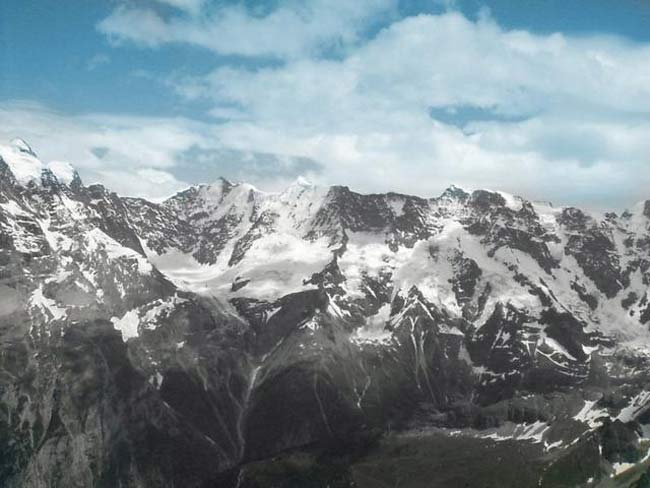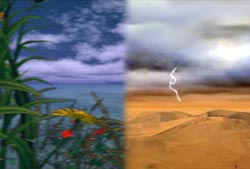
The mountains in Europe are growing taller and melting glaciers are partly responsible, scientists say.
Heavy glaciers cause the Earth's crust to flex inward slightly. When glaciers disappear, the crust springs back and the overlaying mountains are thrust skyward, albeit slowly.
The European Alps have been growing since the end of the last little Ice Age in 1850 when glaciers began shrinking as temperatures warmed, but the rate of uplift has accelerated in recent decades because global warming has sped up the rate of glacier melt, the researchers say.
The finding is detailed in the July Issue of Geophysical Research Letters.
The fluid Earth
The conclusion is based on a new computer model that assumes that over timescales of a few years to thousands of years, the surface of the Earth behaves like a very thick fluid.
"Imagine honey or molasses, only a billion, billion times more viscous," said study leader Valentino Barletta of the University of Milan in Italy. If a heavy object is placed on the surface of such a fluid, it sinks until a balance is reached between the forces of gravity pulling it down and the buoyancy keeping it afloat.
Sign up for the Live Science daily newsletter now
Get the world’s most fascinating discoveries delivered straight to your inbox.
"When you remove the weight, the viscous fluid takes some time to refill the depression that's left behind," Barletta told LiveScience.
This is happening in the Alps. As the glaciers melt and the mountains are freed of their heavy burdens, the surface of the Earth springs back very slowly. This effect is well studied and it occurs in North America, too.
The region where the most uplift is occurring is in the French Alps near Mount Blanc, the tallest mountain in Western Europe. The mountains in this region are growing at a rate of about .035 inches per year. In 50 years, they will be about 1.8 inches taller than today. The average maximum growth for the rest of the Alps is a more modest .013 inches per year.
Glacier shrinkage accounts for half of the observed increase, while other geological factors, such as active shifting of the Earth's tectonic plates, drainage and erosion, are responsible for the rest, the researchers say.
The effects of global warming
Glaciers have been shrinking almost continuously since 1850, but the process has sped up in recent decades because of global warming, Barletta said.
Other studies found that from 1850 to the 1970s, glaciers in the European Alps shrunk by 35 percent. In only the past 30 years, however, the rate of melting has accelerated to the point that the 5,150 glaciers now cover only 50 percent of the area they once did.
Some scientists estimate that if summer air temperatures warm by 5 degrees Fahrenheit (3 Celsius) by the end of the century, 80 percent of the Alps' glacial covering will be gone by 2100; if temperatures increase by 9 degrees Fahrenheit (5 Celsius), the Alps will be almost completely ice-free by century's end.
Elsewhere, scientists have found that melting permafrost has caused portions of mountains to crumble and is making the ground sink right out from under buildings and railroads.
Whether the glaciers disappear or not, the Alps will continue to rise, pushed upwards by other geological forces until complete relaxation is reached, something that could take hundreds or thousands of years, Barletta said.
- Gallery: Magical Mountains
- Gallery: Glaciers Before and After
- VIDEO: Goldilocks and the Greenhouse
- Surprising Side Effects of Global Warming
- Study: Europe's Glaciers Could Disappear this Century
- Mt. Everest Shorter Than Thought
Hot Topic

What makes Earth habitable? This LiveScience original video explores the science of global warming and explains how, for now, conditions here are just right.
The Controversy
- Global Warming or Just Hot Air? A Dozen Different Views
- Global Warming Differences Resolved
- Conflicting Claims on Global Warming and Why It's All Moot
- Baffled Scientists Say Less Sunlight Reaching Earth
- Scientists Clueless over Sun's Effect on Earth
- Greenhouse Gas Hits Record High
- Key Argument for Global Warming Critics Evaporates
The Effects
- Seas Rise
- More Wildfires
- Deserts to Grow
- Greenland Melts
- Ground Collapses
- Glaciers Disappear
- Allergies Get Worse
- Animal DNA Changing
- Animals Change Behavior
- Rivers Melt Sooner in Spring
- Increased Plant Production
- Hurricanes Get Stronger
- Lakes Disappear
The Possibilities
- More Rain but Less Water
- Ice-Free Arctic Summers
- Overwhelmed Storm Drains
- Worst Mass Extinction Ever
- A Chilled Planet
Strange Solutions









